Filter by

Tourism and Conservation-based Development in the Periphery : Lessons from Pa…
This open access book applies a social ecological systems (SES) lens to conservation-based development in Patagonia, bringing together authors with historical, contemporary, and future-oriented perspectives in order to increase understanding of the social and environmental implications of nature-based tourism and other forms of conservation-based territorial development. By focusing on Patagoni…
- Edition
- 1
- ISBN/ISSN
- 9783031380488
- Collation
- XXXIV, 468 hlm,: ill, lamp;
- Series Title
- -
- Call Number
- -
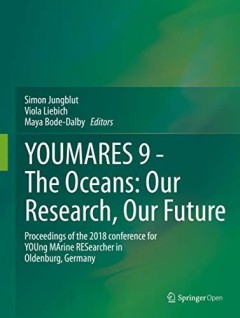
YOUMARES 9 - The Oceans: Our Research, Our Future: Proceedings of the 2018 co…
This open access book summarizes peer-reviewed articles and the abstracts of oral and poster presentations given during the YOUMARES 9 conference which took place in Oldenburg, Germany, in September 2018. The aims of this book are to summarize state-of-the-art knowledge in marine sciences and to inspire scientists of all career stages in the development of further research. These conferences ar…
- Edition
- 1
- ISBN/ISSN
- 9783030203894
- Collation
- XIX, 370 hlm,: ill, lamp;
- Series Title
- -
- Call Number
- -

Riverine Ecosystem Management: Science for Governing Towards a Sustainable Fu…
Buku akses terbuka ini mensurvei batas penelitian ilmiah tentang sungai dan memberikan contoh untuk memandu pengelolaan menuju masa depan ekosistem sungai yang berkelanjutan. Struktur dan fungsi utama biogeosfer sungai dijelaskan; ancaman utama diidentifikasi, dan solusi efektif untuk pemulihan dan mitigasi diberikan. Sungai merupakan salah satu ekosistem yang paling terancam di dunia. Sungai s…
- Edition
- 1
- ISBN/ISSN
- 978-3-319-73250-3
- Collation
- 1 online resource ( VII, 571 Pages)
- Series Title
- -
- Call Number
- 577.6 SCH r

Entscheidungen in die weite Zukunft : Ungewissheiten bei der Entsorgung hochr…
In diesem Open-Access-Buch werden Wege aufgezeigt, mit verschiedenen Formen von Ungewissheiten und der Dynamik von Ungewissheiten bezüglich der Entsorgung radioaktiver Abfälle umzugehen. Die sichere Entsorgung radioaktiver Abfälle erfordert es, über Zeiträume von bis zu einer Million Jahre hinaus zu planen. Ein solches Vorhaben ist von erheblichen Ungewissheiten begleitet, die sich zudem a…
- Edition
- -
- ISBN/ISSN
- 978-3-658-42698-9
- Collation
- IX, 403
- Series Title
- Energiepolitik und Klimaschutz. Energy Policy and Climate Protection (EPKS)
- Call Number
- -
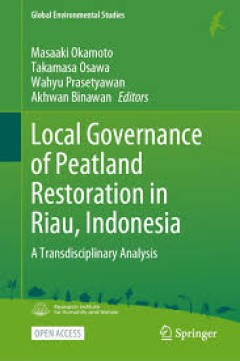
Local Governance of Peatland Restoration in Riau, Indonesia : A Transdiscipli…
This open access book is one in a series of four volumes introducing peatland conservation and restoration in Indonesia. It focuses on local governance, in particular on regional and local perspectives in Riau, the most peat-destructed province of Indonesia. The book fills a vital gap in the existing literature that overlooks social science and humanities perspectives. Written by authors from d…
- Edition
- -
- ISBN/ISSN
- 978-981-99-0902-5
- Collation
- XII, 333
- Series Title
- Global Environmental Studies (GENVST)
- Call Number
- -

The European Landing Obligation: Reducing Discards in Complex, Multi-Species …
This open access book provides a comprehensive examination of the European Landing Obligation policy from many relevant perspectives. It includes evaluations of its impacts at economical, socio-cultural, ecological and institutional levels. It also discusses the feasibility and benefits of several potential mitigation strategies. The book was timely published, exactly at the time where the Land…
- Edition
- 1
- ISBN/ISSN
- 9783030033088
- Collation
- XIX, 431 hlm,: ill, lamp;
- Series Title
- -
- Call Number
- -

Biodiversity of Angola: Multidisciplinary Methods and Tools for a Low Carbon …
This open access book analyzes and seeks to consolidate the use of robust quantitative tools and qualitative methods for the design and assessment of energy and climate policies. In particular, it examines energy and climate policy performance and associated risks, as well as public acceptance and portfolio analysis in climate policy, and presents methods for evaluating the costs and benefits o…
- Edition
- 1
- ISBN/ISSN
- 9783030030834
- Collation
- XVIII, 549hlm,: ill, lamp;
- Series Title
- -
- Call Number
- -
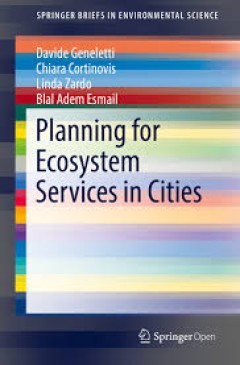
Planning for Ecosystem Services in Cities
This open access book presents current knowledge about ecosystem services (ES) in urban planning, and discusses various urban ES topics such as spatial distribution of urban ecosystems, population distribution, and physical infrastructure properties. The book addresses all these issues by: i) investigating to what extent ecosystem services are currently included in urban plans, and discussing w…
- Edition
- -
- ISBN/ISSN
- 978-3-030-20024-4
- Collation
- IX, 87
- Series Title
- SpringerBriefs in Environmental Science (BRIEFSENVIRONMENTAL)
- Call Number
- 570 GEN p
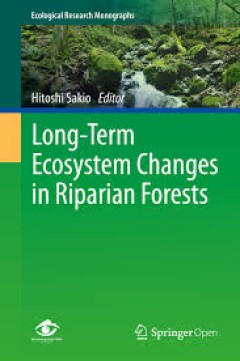
Long-Term Ecosystem Changes in Riparian Forests
This open access book presents and analyzes the results of more than 30 years of long-term ecological research in riparian forest ecosystems with the aim of casting light on changes in the dynamics of riparian forests over time. The research, focusing on the Ooyamazawa riparian forest, one of the remaining old-growth forests in Japan, has yielded a number of interesting outcomes. First, it show…
- Edition
- -
- ISBN/ISSN
- 978-981-15-3009-8
- Collation
- VIII, 234
- Series Title
- Ecological Research Monographs (ECOLOGICAL)
- Call Number
- 570 LON
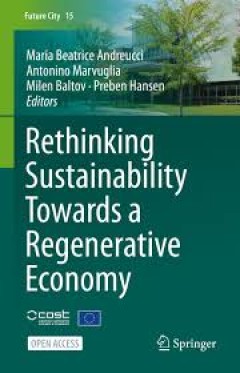
Rethinking Sustainability Towards a Regenerative Economy
This open access book is based on work from the COST Action “RESTORE - REthinking Sustainability TOwards a Regenerative Economy'', and highlights how sustainability in buildings, facilities and urban governance is crucial for a future that is socially just, ecologically restorative, and economically viable, for Europe and the whole planet. In light of the search for fair solutions to the clim…
- Edition
- -
- ISBN/ISSN
- 978-3-030-71819-0
- Collation
- XXXV, 418
- Series Title
- Future City (FUCI, volume 15)
- Call Number
- 307 RET
 Computer Science, Information & General Works
Computer Science, Information & General Works  Philosophy & Psychology
Philosophy & Psychology  Religion
Religion  Social Sciences
Social Sciences  Language
Language  Pure Science
Pure Science  Applied Sciences
Applied Sciences  Art & Recreation
Art & Recreation  Literature
Literature  History & Geography
History & Geography